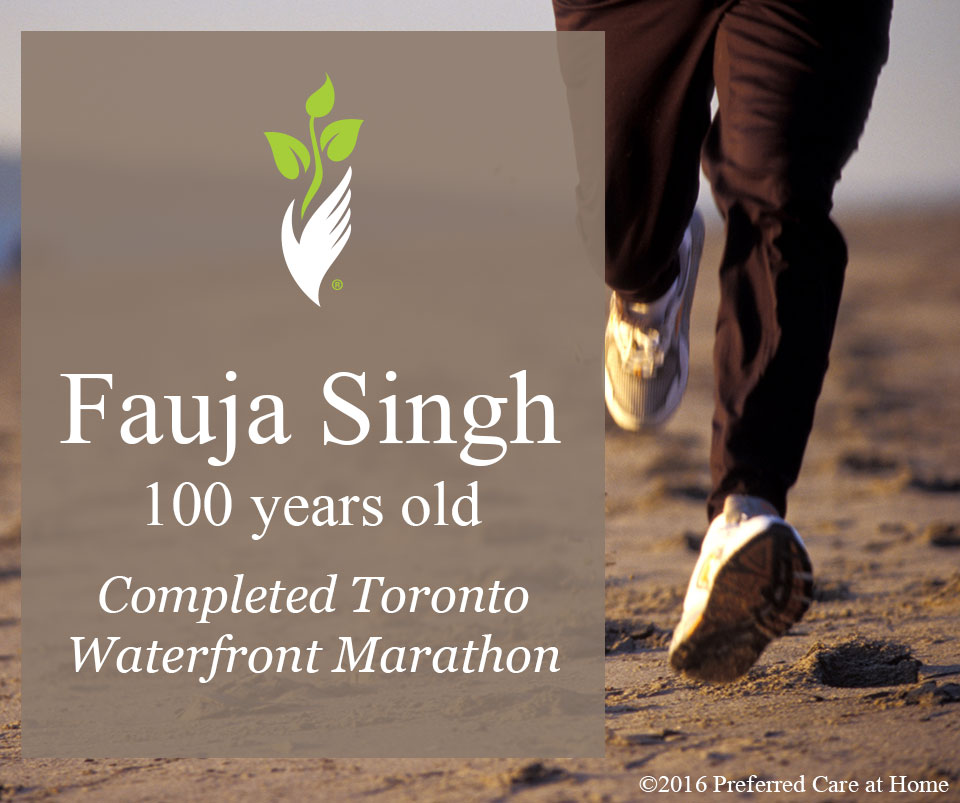The Age of Running
Published July 26, 2016 by Ashly Luckose, Esq. in Senior Health & Wellness

People who run in marathons have certain common traits. Marathons are for the physically fit, the mentally determined, and the young.
Fauja Singh must have missed that last part, because at the not-so-young age of 100 he entered into and completed the Toronto Waterfront Marathon, breaking most if not all of the previous record for his age bracket.
Singh’s accomplishment was a personal one. But whether he intended to or not, it has been adopted as proof that age as a limitation to life and experiences is vastly overrated.
And it is no coincidence that Singh and other elderly runners are so healthy and capable at such an advanced age. Studies, like the one from the Stanford University School of Medicine, have shown that elderly runners have fewer disabilities, a longer span of active life, and are half as likely as their aging non-running counterparts to die early deaths.
If you are hesitant to run or exercise due to some reasonable concern, such as not having enough information about running or training programs and other related issues, worry no more!
There are many resources online that are detailed, helpful, and freely available. One very good one comes from Hal Higdon, an author who has been running for half a century, who developed a running program specifically for seniors. You can find his program here.
For those looking for general tips and advice, here are some from the running blog walkjogrun.net:
- Wear proper running shoes. This is even more crucial if you have peripheral arterial disease, diabetes, or another condition that affects your feet.
- Begin slowly. If you’re new to exercise, start by walking for several weeks. Once you get in better shape, add short spurts of running to your walking routine. Eventually, you’ll be able to run for longer periods of time.
- Ease into each run. Start each run by walking for a few minutes, giving your body plenty of time to adequately warm up.
- Stretch. Muscle elasticity declines with age, so older adults should be extra mindful about stretching after each run.
- Strength training regularly. Every runner should strength train, but it’s even more important for senior runners. Resistance training exercises will help prevent age-related muscle loss and lower your chance of injury.
- Take plenty of rest days. Older runners take longer to recover from tough workouts than younger runners do, so take rest days when needed.
- Drink enough water. People tend to drink less water as they age, which ups the risk for dehydration. Drink plenty of water before, during, and after running to stay hydrated.
- Listen to your body. This is one of the golden rules of running no matter your age. Seniors are more prone to injury and are more likely to have health problems. Stop running and see your doctor at the first sign of injury or illness.
If the only thing stopping you is your age, then please do look at Singh’s life as an example and strive to overcome those thoughts and worries!
If you have questions about senior home
care services or if you want to start care:
Related Posts

January 27, 2025
Is There a Food Allowance Card for Seniors?
Jody Guerrieri, RN.

January 27, 2025
What Causes Glassy Eyes in the Elderly?
Jody Guerrieri, RN.

January 27, 2025
What Age Is Considered a Senior Citizen?
Jody Guerrieri, RN.
Helping seniors age in place, with dignity & grace.